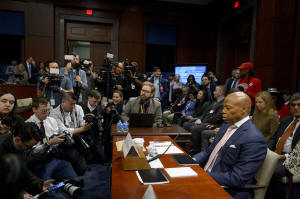Republicans hammer mayors of Boston, Chicago, Denver and New York over
'sanctuary city' policies
[March 06, 2025]
By REBECCA SANTANA and TIM SULLIVAN
WASHINGTON (AP) — Republican members of Congress hammered four
Democratic mayors Wednesday about their so-called sanctuary city
policies, accusing them of endangering Americans and threatening to
prosecute local officials. The mayors pushed back, defending their
communities as welcoming places — not lawless danger zones — and called
on Congress to pass immigration reforms.
The comments came in an often fiery hearing before the House Committee
on Oversight and Government Reform, where Republicans said the mayors
were undermining President Donald Trump's immigration and mass
deportation efforts.
Republicans repeatedly highlighted a handful of brutal crimes committed
by immigrants who crossed illegally into the U.S., with Rep. James Comer
opening the hearings by saying the policies “only create sanctuary for
criminals.”
But the Democratic mayors — Michelle Wu of Boston, Brandon Johnson of
Chicago, Mike Johnston of Denver and Eric Adams of New York — defended
their policies as legal, even as they seemed to carefully avoid using
the term “sanctuary.”
Republicans, they said, were trying to paint their cities as overrun by
criminal immigrants even as crime was falling. The mayors said a key to
safety is creating cities where residents feel comfortable reporting
crimes and working with police.
“We know there are myths about these laws. But we must not let
mischaracterizations and fearmongering obscure the reality that
Chicago’s crime rates are trending down,” Johnson told the committee in
a hearing room packed with reporters and onlookers. “We still have a
long way to go, but sensationalizing tragedy in the name of political
expediency is not governing. It’s grandstanding.”

There’s no legal definition for sanctuary city policies, but they
generally limit cooperation by local law enforcement with federal
immigration officers. Courts have repeatedly upheld the legality of
sanctuary laws.
Illegal immigration was a key plank of Trump’s presidential campaign,
and he has repeatedly pressed on the theme since coming to office,
including a Tuesday night speech to Congress where he vowed to “complete
the largest deportation operation in American history.”
Republicans have largely echoed Trump.
“We cannot let pro-criminal alien policies and obstructionist sanctuary
cities continue to endanger American communities and the safety of
federal immigration enforcement officers,” Comer said Wednesday.
But Denver’s Johnston said that crime dropped when the city was faced
with an influx of immigrants, many bused from border states by
Republican politicians. Like the other mayors, he said the onus should
be on Congress to update federal immigration laws.
“If Denver can find a way to put aside our ideological differences long
enough to manage a crisis we didn’t choose or create, it seems only fair
to ask that the body that is actually charged with solving this national
problem — this Congress — can finally commit to do the same,” he said.
Adams got some of the only praise from Republican lawmakers, with Comer
thanking him for working with Immigration and Customs Enforcement.
Adams’ critics say his collaboration is part of an effort to wriggle out
of federal corruption charges, though even before Trump was elected, the
mayor called on city lawmakers to allow New York police to work more
with ICE. The Trump administration ordered prosecutors to drop the case
against Adams on the grounds that it was distracting him from helping
the immigration crackdown and hindering his reelection campaign.
[to top of second column]
|

New York City Mayor Eric Adams takes his seat at the witness table
during a House Committee on Oversight and Government Reform hearing
with Sanctuary City Mayors on Capitol Hill, Wednesday, March 5,
2025, in Washington. (AP Photo/Rod Lamkey, Jr.)

Democratic lawmakers questioned him sharply over his work with the
Trump administration and Justice Department orders to drop the
charges.
“Are you selling out New Yorkers to save yourself from prosecution?”
asked Rep. Robert Garcia of California.
“There’s no deal, no quid pro quo. And I did nothing wrong,” Adams
said.
Immigration law, the mayors said, is a federal responsibility, and
the attempt to put that responsibility on local law enforcement
makes communities distrust the police and others they may need to
call for help. Trump's crackdown, the mayors said, has terrified
immigrants, many of them in the U.S. legally.
“I spoke with pastors whose pews are half-empty on Sundays,” said
Wu, whose parents immigrated to the U.S. from Taiwan. “Doctors whose
patients are missing appointments, teachers whose students aren’t
coming to class, neighbors afraid to report crimes in their
communities, and victims of violence who won’t call the police.
“This federal administration is making hard-working, taxpaying,
God-fearing residents afraid to live their lives.”
In communities that don't cooperate on immigration, ICE agents go in
to track down people after their release. ICE argues that this is
dangerous and strains resources.
Ohio Republican Rep. Jim Jordan mocked Johnston for insisting his
city was safe, referring to a recent arrest in which an ICE team
chased a suspect through a jail parking lot after he was released
from custody. In video provided by the Denver Department of Public
Safety, the suspect and an agent appear to collide, and another
trips and falls during the incident.
“That’s a lie because it was not safer for the ICE agents who are
part of your community. No way was it safer,” he said.
Republicans also repeatedly raised the possibility that officials in
sanctuary cities could face prosecution for breaking federal law,
with Rep. Anna Paulina Luna of Florida saying she would be referring
the mayors to the Justice Department for investigation.
“Your policies are hurting the American people,” she told them.
Legal experts say that while charges could theoretically be filed,
it is highly unlikely they would result in convictions.
The mayors were repeatedly asked about when they would cooperate
with ICE and often replied that they would under a criminal warrant.
That point can be important — the legality of sanctuary laws often
hinges on the distinction between two types of warrants.
Sanctuary policies typically require local law enforcement to honor
criminal warrants, which are signed by judges and allow agents to
forcibly enter homes and make arrests related to alleged crimes.

Immigration agents, though, more often have administrative warrants,
which are issued by ICE and not always recognized by local
jurisdictions. Those warrants can be used to detain someone for
violating immigration law but don’t let agents enter homes without
permission.
Some six hours after the hearing began, Comer called it to an end.
“Believe it or not, this is the best-behaved this committee has been
all Congress,” he said.
___
Sullivan reported from Minneapolis. Associated Press writers Sophia
Tareen in Chicago, Cedar Attanasio in New York and Colleen Slevin in
Denver contributed to this report.
All contents © copyright 2025 Associated Press. All rights reserved |